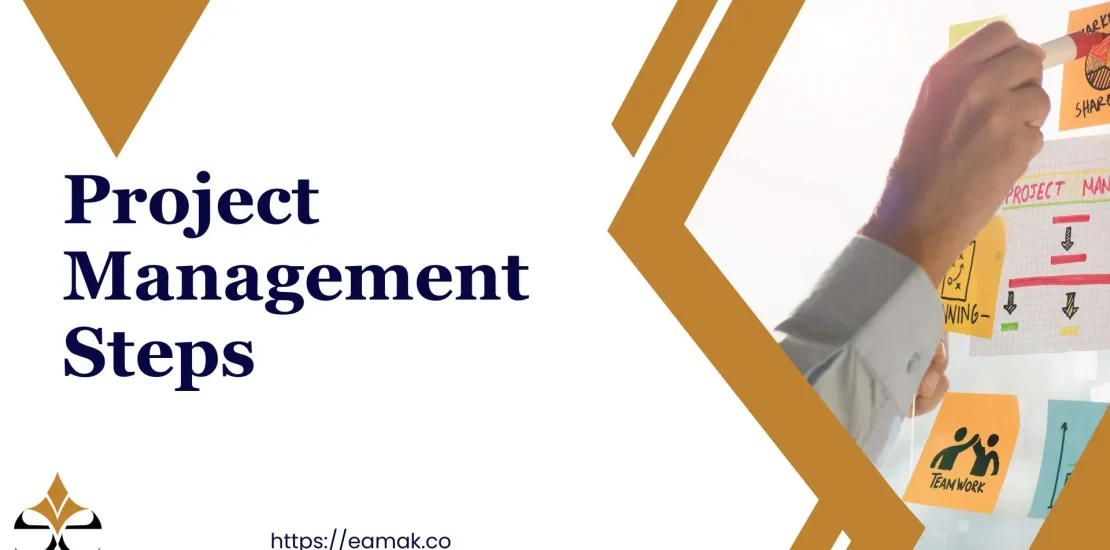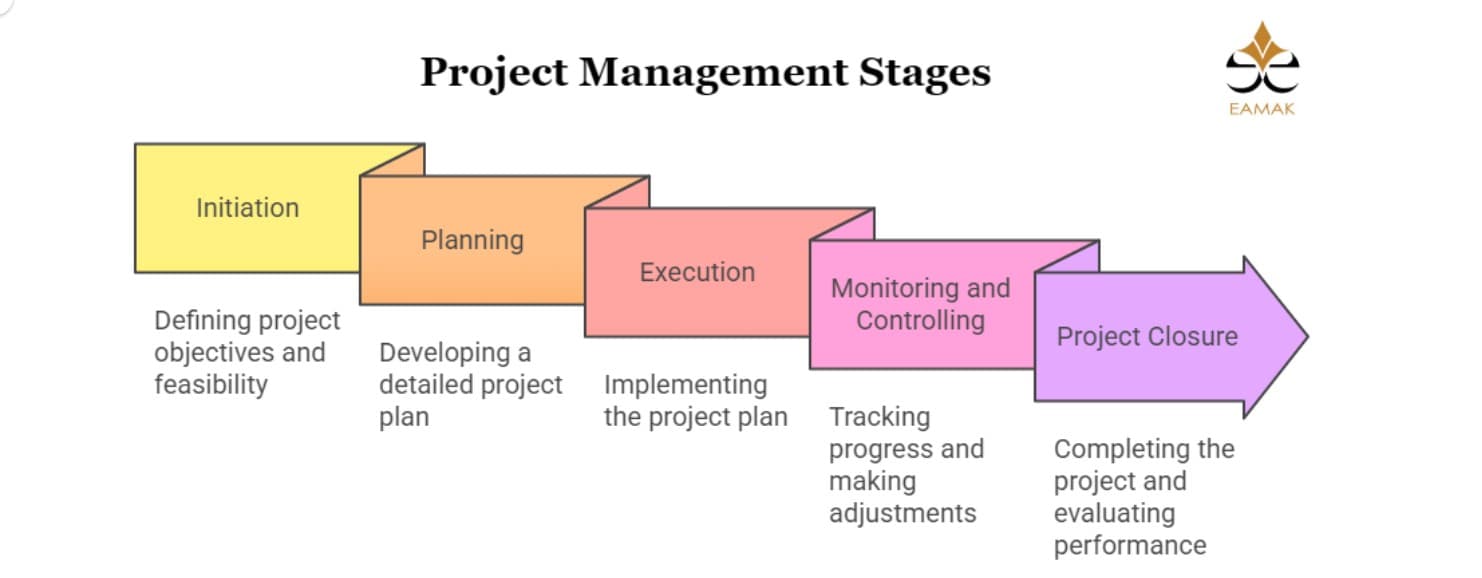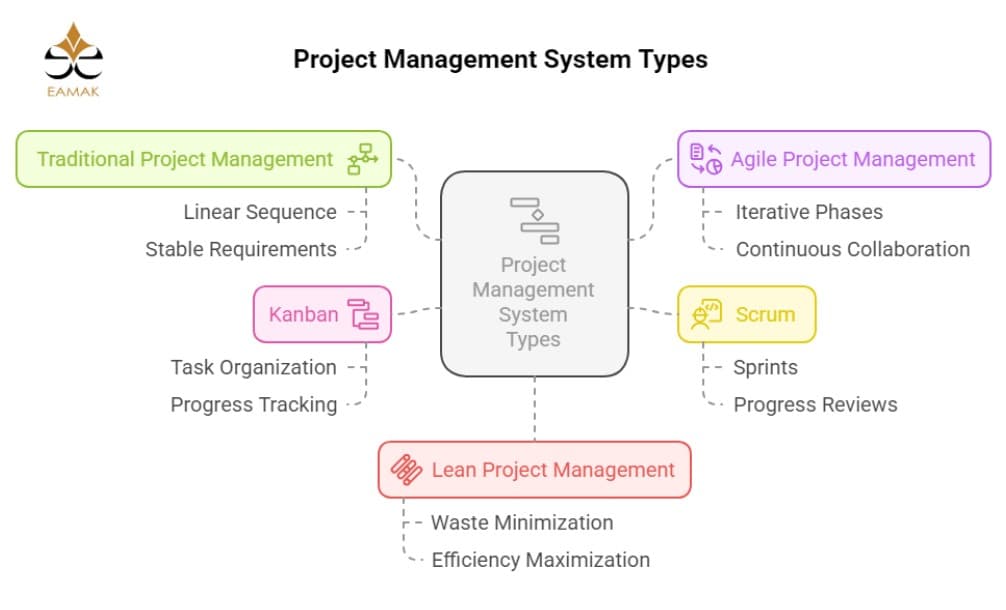Project Management Steps: Your Comprehensive Guide to Project Success
- March 19, 2025
- Posted by: Shimaa Ahmed
- Category: Uncategorized

Project management steps are the foundation of any successful project. They facilitate effective planning, resource organization, and goal achievement with efficiency. Through proper management, risks can be minimized, ensuring a seamless execution of projects.
In this article, we will explore the key steps and stages necessary to guarantee project success and answer the question: What are the project management stages? Keep reading to learn more.
What is a Project?
Many people wonder: what is a project? The answer is that a project is any temporary endeavor undertaken to achieve a specific goal, such as building a house or organizing an event. A project has a defined beginning and end and requires resources like time, effort, and money to be successfully completed.
Key Characteristics of a Project:
- Defined timeframe: A project operates within a specific timeframe, with a clear start and end.
- Goal achievement: The purpose of a project is to accomplish specific objectives or benefits.
- Resource utilization: Projects require specific resources, including time, money, and workforce.
- Uniqueness: Every project is distinct, even if it shares objectives with others, due to varying circumstances and requirements.
What are the project management stages?

Stage One: Initiation
This is the first step in Project management steps, where the project idea and main objectives are defined. The feasibility of the project is assessed, and a project charter is created to outline its goals and scope.
During this stage, the project team evaluates whether the project is worth pursuing by analyzing the following:
- What are the business justifications for the project?
- What benefits will the project deliver?
- What are the key outputs and expected results?
- What criteria will determine the project’s success?
After answering these questions, the team decides whether to proceed with the project or reassess its viability.
Stage Two: Planning
This is one of the most critical project management stages, where the team develops a clear plan to ensure successful project completion.
Careful planning is essential, as poor planning can lead to project failure due to inaccurate time estimates, unclear objectives, or weak execution strategies.
Key questions to address during the planning phase:
- What is the project’s main objective?
- What is the project scope?
- What are the key performance indicators (KPIs)?
- What is the allocated budget?
- What are the potential risks, and how will they be managed?
- Who are the team members involved?
- What tasks need to be completed?
- What are the major milestones to be achieved?
Once these questions are answered, a Work Breakdown Structure (WBS) is developed, breaking the project into smaller, manageable tasks with assigned timeframes, costs, and requirements.
The final project plan should be stored in an accessible location for the team, such as Confluence or another project management system.
Stage Three: Execution
This phase involves executing the project plan and carrying out assigned tasks. It requires continuous communication and coordination among team members. The project manager plays a crucial role in ensuring smooth workflow and addressing any emerging issues.
Stage Four: Monitoring and Controlling
This stage runs parallel to the execution phase and involves tracking project progress and comparing actual performance against the initial plan.
Key aspects monitored include:
- Timeline adherence
- Work quality
- Budget control
Adjustments are made if necessary to keep the project on track.
Stage Five: Project Closure
This is the final step in Project management steps, occurring after all tasks have been completed and project goals achieved. The results are delivered to the client or company, and the team’s performance is evaluated.
This phase is crucial for learning from past experiences and improving future project execution.
Why Do Companies Need a Project management system?
Companies require a project management system for several important reasons that contribute to their overall success:
- Improved Planning & Organization: Helps in developing clear plans that define tasks and resources needed for execution.
- Efficient Resource Management: Ensures budget and time are allocated efficiently to minimize waste and enhance success rates.
- Enhanced Communication & Coordination: Facilitates seamless interaction among team members, reducing misunderstandings.
- Risk Management: Identifies potential risks early and establishes strategies to mitigate them before they impact the project.
- Scope Control: Prevents unplanned expansion and keeps the team focused on core objectives.
- Higher Quality Deliverables: Ensures continuous performance monitoring for quality assurance.
- Competitive Advantage: Enables companies to execute projects more efficiently than competitors, increasing their market success.
A project management system is not just a tool but a vital element for business success and sustainability.
What Are the Project Management System Types?

- Traditional Project Management (Waterfall):
- Follows a linear sequence where each phase is completed before the next begins.
- Ideal for projects with stable requirements.
- Agile Project Management:
- Emphasizes flexibility and adaptability to changes.
- Breaks the project into short, iterative phases for continuous collaboration and improvement.
- Scrum:
- A structured framework for managing projects, especially software development.
- Involves short cycles called “sprints” with regular progress reviews.
- Kanban:
- A visual workflow management system that organizes tasks on a board divided into columns.
- Ensures continuous progress tracking and efficiency.
- Lean Project Management:
-
- Focuses on minimizing waste and maximizing efficiency.
- Ideal for projects requiring cost reduction and improved customer satisfaction.
Selecting the right Project management system depends on project specifics, environment, and required efficiency.
What Are the Project management objectives?
The primary Project management objectives focus on achieving core project goals efficiently. These include:
- Defining Project Scope & Objectives: Establishing clear project goals to ensure all stakeholders are aligned.
- Minimizing managerial risks: reducing potential risks to the lowest possible level.
- Securing Necessary Resources: Ensuring appropriate human and material resources are available for successful execution.
- Building an Effective Team: Assembling a skilled team with clearly defined roles.
- Developing a Comprehensive Work Plan: Connecting available resources with desired outcomes, defining budgets and timelines.
- Monitoring & Controlling Execution: Tracking progress, ensuring adherence to plans, and making necessary adjustments.
- Ensuring Effective Communication: Facilitating smooth information exchange among team members.
- Successful Project Closure: Completing all project activities and documenting key takeaways for future improvements.
Achieving these Project management objectives ensures project efficiency and compliance with time and budget constraints.
Conclusion:Project management is not just about task execution—it is a comprehensive process encompassing planning, execution, monitoring, and control to ensure goal achievement.
By following Project management steps correctly, you can optimize resource utilization, reduce risks, and enhance result quality.
If you need expert consultation to ensure your project’s success, don’t hesitate to contact EAMAK professionals for the best outcomes.

